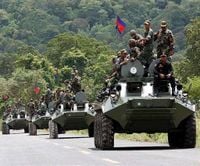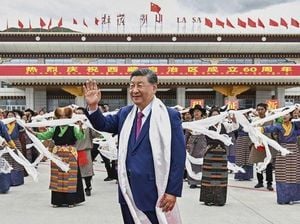Cambodia is set to activate its long-dormant military conscription law starting in 2026, a move announced by Prime Minister Hun Manet on July 14, 2025, amid escalating border tensions with neighboring Thailand. This decision marks a significant shift in Cambodia’s defense posture, aiming to bolster national security and modernize its military forces in response to recent confrontations and ongoing geopolitical strains.
At a ceremony commemorating the 32nd anniversary of the Royal Gendarmerie in Kampong Chhnang province, Hun Manet, donned in his four-star general uniform, revealed plans to enforce the 2006 Law on Compulsory Military Service, which has remained inactive since its passage nearly two decades ago. Under the original legislation, Cambodian men aged 18 to 30 were required to serve 18 months, with military service for women remaining voluntary. However, the Prime Minister announced amendments that will extend mandatory service to 24 months, or two full years, to better prepare conscripts for the demands of modern military life.
"This episode of confrontation is a lesson for us and is an opportunity for us to review, assess, and set our targets to reform our military," Hun Manet said, directly linking the conscription move to the intensified border dispute with Thailand. The Prime Minister emphasized that the conscription initiative is not about aggression but about strengthening Cambodia’s capacity to defend its territorial integrity.
The border tensions between Cambodia and Thailand have been simmering throughout 2025 but escalated sharply following an armed clash on May 28, where a Cambodian soldier lost his life. Since then, diplomatic relations have deteriorated, with most land border crossings closed, Cambodia halting fuel imports from Thailand, and both countries cutting internet and phone communications across their shared borders. The dispute has also spilled into Thailand’s domestic politics, with Prime Minister Paetongtarn Shinawatra suspended pending an ethics investigation related to a leaked phone call with former Cambodian Prime Minister Hun Sen, Hun Manet’s father.
In addition to activating conscription, Hun Manet announced plans to modernize the Cambodian military structure, develop human resources, and upgrade equipment. He acknowledged that much of Cambodia’s weaponry was destroyed during the turbulent years between 1993 and 1998, which has left the country in need of substantial military reform and investment.
Regarding defense spending, Hun Manet explained that after the war and the implementation of a "win-win policy," Cambodia redirected a significant portion of its defense budget toward social sectors such as education, healthcare, and human resource development. However, he now advocates for a careful increase in defense funding. "We need to modernise military equipment, strengthen and evaluate the troops and military capabilities, and monitor and increase the budget in military operations and development," he said. The Prime Minister was clear that this budget increase is "not aimed at waging war or seizing others’ territory, but solely for protecting Cambodian soil." Cambodia’s 2025 national budget totals $9.32 billion, with $739 million currently allocated to defense.
Hun Manet also highlighted the practical benefits of conscription beyond military readiness. The two-year training period will offer conscripts discipline and insight into military life, potentially making them more attractive hires in the civilian job market. "Many companies may prefer to hire individuals who have undergone this training for their workforce," he noted, emphasizing the dual value of conscription for both national defense and societal development.
The upcoming conscription system will require all Cambodian citizens aged 18 to 30 to serve, with military service for women remaining voluntary. After completing their training, individuals can choose to return to civilian life or continue their careers in the military. This approach aims to build a more professional and capable military force while offering young Cambodians new opportunities.
Should the conscription law go into effect as planned, Cambodia will join five other Southeast Asian countries—Singapore, Vietnam, Thailand, Laos, and Myanmar—that maintain compulsory military service, though each country’s terms and exemptions vary widely. Thailand, for instance, has a longstanding conscription system for men turning 20, with an annual lottery determining who serves. According to the CIA World Factbook, Cambodia’s armed forces currently number approximately 200,000 personnel, including military police, while Thailand maintains a larger force of about 350,000 active-duty members.
The decision to implement conscription also comes amid a crackdown on alleged transnational crime linked to the border dispute. Thai authorities recently raided properties belonging to Kok An, a prominent Cambodian tycoon and senator with close ties to the border town of Poipet, known for casinos and online scam operations. Kok An faces charges related to money laundering and running a massive call center scam targeting Thai citizens, with a warrant issued for his arrest. Cambodia has denied harboring such criminal activities, but the tension has added another layer to the already strained bilateral relations.
Despite these challenges, Hun Manet called for a de-escalation of tensions and urged Thailand to reopen all border crossings without conditions. He promised that Cambodia would reciprocate promptly, signaling a willingness to restore normalcy if mutual steps are taken.
As Cambodia embarks on this significant military reform path, the world will be watching how conscription reshapes its defense capabilities and regional posture. With a focus on modernization, discipline, and national security, Cambodia’s move reflects a broader trend in Southeast Asia where countries balance historical tensions with efforts to strengthen sovereignty and stability.





